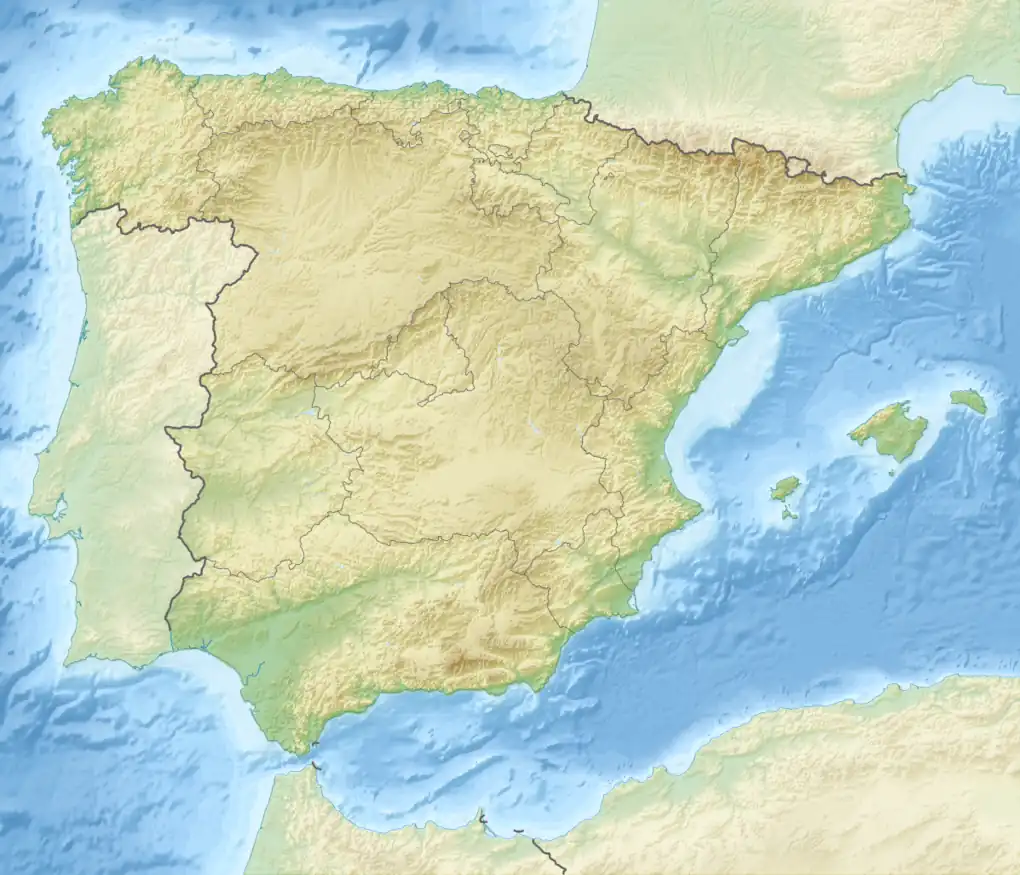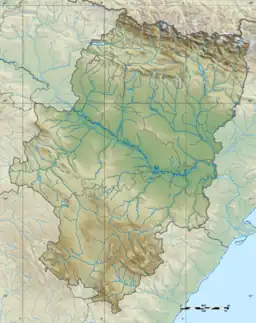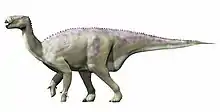| Arcillas de Morella Formation | |
|---|---|
| Stratigraphic range: | |
| Type | Geological formation |
| Underlies | Xert Formation |
| Overlies | Artoles Formation |
| Lithology | |
| Primary | Sandstone, clay |
| Other | Marl, limestone, siltstone, conglomerate |
| Location | |
| Region | Europe |
| Country | |
| Type section | |
| Named for | Morella, Castellón |
| Named by | Canérot et al. |
| Year defined | 1982 |
 Arcillas de Morella Formation (Spain)  Arcillas de Morella Formation (Aragon) | |
The Arcillas de Morella Formation is a geological formation in Spain whose strata date back to the Barremian stage of the Early Cretaceous.[1] Dinosaur remains are among the fossils that have been recovered from the formation.[2]
Geology
The formation was formally named and defined by Canérot and colleagues in 1982.[3] The formation predominantly consists of red clays and continental sandstones, with some marine intercalations.[4]
Vertebrate paleofauna
| Dinosaurs of the Arcillas de Morella Formation | |||
|---|---|---|---|
| Taxa | Species | Notes | Images |
| Hypsilophodon[2] |
| ||
| Iguanodon | I. bernissartensis[5] | An iguanodonian dinosaur | |
| Mantellisaurus | M. cf. atherfieldensis[5] | An iguanodontian dinosaur | |
| Morelladon | Morelladon beltrani[6] | An iguanodontian dinosaur | |
| Vallibonavenatrix | V. cani[4] | A spinosaurid theropod | |
| Protathlitis | P. cinctorrensis[7] | A spinosaurid theropod | |
| Baryonychinae[2] | Indeterminate remains.[2] | ||
| Garumbatitan | G. morellensis | A somphospondylan sauropod[8] | |
| Titanosauriformes | Indeterminate | At least two distinct taxa, including a somphospondylan[9] | |
Turtles
| Turtles of the Arcillas de Morella Formation | |||
|---|---|---|---|
| Taxa | Species | Notes | Images |
| Brodiechelys | B. royoi[10] | A xinjiangchelyid turtle | |
| Eodortoka | E. morellana[11] | A dortokid turtle | |
Plesiosaurs
| Plesiosaurs of the Arcillas de Morella Formation | ||||
|---|---|---|---|---|
| Taxa | Presence | Notes | Images | |
| Leptocleididae[12] | ||||
Correlation
| Ma | Age | Paleomap \ Basins | Cantabrian | Olanyà | Cameros | Maestrazgo | Oliete | Galve | Morella | South Iberian | Pre-betic | Lusitanian | ||
|---|---|---|---|---|---|---|---|---|---|---|---|---|---|---|
| 100 | Cenomanian |  | La Cabana | Sopeira | Utrillas | Mosquerela | Caranguejeira | |||||||
| Altamira | Utrillas | |||||||||||||
| Eguino | ||||||||||||||
| 125 | Albian | Ullaga - Balmaseda | Lluçà | Traiguera | ||||||||||
| Monte Grande | Escucha | Escucha | Jijona | |||||||||||
| Itxina - Miono | ||||||||||||||
| Aptian | Valmaseda - Tellamendi | Ol Gp. - Castrillo | Benassal | Benassal | Olhos | |||||||||
| Font | En Gp. - Leza | Morella/Oliete | Oliete | Villaroya | Morella | Capas Rojas | Almargem | |||||||
| Patrocinio - Ernaga | Senyús | En Gp. - Jubela | Forcall | Villaroya | Upper Bedoulian | Figueira | ||||||||
| Barremian | Vega de Pas | Cabó | Abejar | Xert | Alacón | Xert | Huérguina | Assises | ||||||
| Prada | Artoles | Collado | Moutonianum | Papo Seco | ||||||||||
| Rúbies | Tera Gp. - Golmayo | Alacón/Blesa | Blesa | Camarillas | Mirambel | |||||||||
| 150 | Hauterivian |  | Ur Gp. - Pinilla | Llacova | Castellar | Tera Gp. - Pinilla | Villares | Porto da Calada | ||||||
| hiatus | ||||||||||||||
| Huerva | Gaita | |||||||||||||
| Valanginian | Villaro | Ur Gp. - Larriba | Ped Gp. - Hortigüela | |||||||||||
| Ped Gp. - Hortigüela | Ped Gp. - Piedrahita | |||||||||||||
| Peñacoba | Galve | Miravetes | ||||||||||||
| Berriasian |  | Cab Gp. - Arcera | Valdeprado | hiatus | Alfambra | |||||||||
| TdL Gp. - Rupelo | Arzobispo | hiatus | Tollo | |||||||||||
| On Gp. - Huérteles Sierra Matute | ||||||||||||||
| Tithonian | Lastres | Tera Gp. - Magaña | Higuereles | Tera Gp. - Magaña | Lourinhã | |||||||||
| Arzobispo | ||||||||||||||
| Ágreda | ||||||||||||||
| Legend | Major fossiliferous, oofossiliferous, ichnofossiliferous, coproliferous, minor formation | |||||||||||||
| Sources | ||||||||||||||
See also
References
- ↑ Villanueva-Amadoz, Uxue; Santisteban, Carlos; Santos-Cubedo, Andrés (2015-04-03). "Age determination of the Arcillas de Morella Formation (Maestrazgo Basin, Spain)". Historical Biology. 27 (3–4): 389–397. doi:10.1080/08912963.2013.874422. ISSN 0891-2963. S2CID 128775513.
- 1 2 3 4 Weishampel, David B; et al. (2004). "Dinosaur distribution (Early Cretaceous, Europe)." In: Weishampel, David B.; Dodson, Peter; and Osmólska, Halszka (eds.): The Dinosauria, 2nd, Berkeley: University of California Press. Pp. 562. ISBN 0-520-24209-2.
- ↑ Villanueva-Amadoz, Uxue; Santisteban, Carlos; Santos-Cubedo, Andrés (2015-04-03). "Age determination of the Arcillas de Morella Formation (Maestrazgo Basin, Spain)". Historical Biology. 27 (3–4): 389–397. doi:10.1080/08912963.2013.874422. ISSN 0891-2963. S2CID 128775513.
- 1 2 Elisabete Malafaia; José Miguel Gasulla; Fernando Escaso; Iván Narváez; José Luis Sanz; Francisco Ortega (2019). "A new spinosaurid theropod (Dinosauria: Megalosauroidea) from the late Barremian of Vallibona, Spain: Implications for spinosaurid diversity in the Early Cretaceous of the Iberian Peninsula". Cretaceous Research. in press: 104221. doi:10.1016/j.cretres.2019.104221.
- 1 2 Gasulla, José M.; Escaso, Fernando; Ortega, Francisco; Sanz, José L. (January 2014). "New hadrosauriform cranial remains from the Arcillas de Morella Formation (lower Aptian) of Morella, Spain". Cretaceous Research. 47: 19–24. doi:10.1016/j.cretres.2013.10.004.
- ↑ Gasulla, José Miguel; Escaso, Fernando; Narváez, Iván; Ortega, Francisco; Sanz, José Luis (2015). "A New Sail-Backed Styracosternan (Dinosauria: Ornithopoda) from the Early Cretaceous of Morella, Spain". PLOS ONE. 10 (12): e0144167. Bibcode:2015PLoSO..1044167G. doi:10.1371/journal.pone.0144167. PMC 4691198. PMID 26673161.
- ↑ Santos-Cubedo, A.; de Santisteban, C.; Poza, B.; Meseguer, S. (2023). "A new spinosaurid dinosaur species from the Early Cretaceous of Cinctorres (Spain)". Scientific Reports. 13 (1). 6471. doi:10.1038/s41598-023-33418-2. hdl:10234/203142.
- ↑ Mocho, Pedro; Escaso, Fernando; Gasulla, José M; Galobart, Àngel; Poza, Begoña; Santos-Cubedo, Andrés; Sanz, José L; Ortega, Francisco (2023-09-28). "New sauropod dinosaur from the Lower Cretaceous of Morella (Spain) provides new insights on the evolutionary history of Iberian somphospondylan titanosauriforms". Zoological Journal of the Linnean Society. doi:10.1093/zoolinnean/zlad124. ISSN 0024-4082.
- ↑ Mocho, P.; Pérez-García, A.; Gasulla, J. M.; Ortega, F. (2017-06-01). "High sauropod diversity in the upper Barremian Arcillas de Morella Formation (Maestrat Basin, Spain) revealed by a systematic review of historical material". Journal of Iberian Geology. 43 (2): 111–128. doi:10.1007/s41513-017-0012-8. ISSN 1886-7995. S2CID 134844724.
- ↑ Pérez-García, A.; Gasulla, J.M.; Ortega, F. (2014). "A new turtle species of Brodiechelys from the Early Cretaceous of Spain: Systematic and palaeobiogeographic implications" (PDF). Acta Palaeontologica Polonica. 59 (2): 333–342.
- ↑ Pérez-García, A.; Gasulla, J.M.; Ortega, F. (2014-03-01). "Eodortoka morellana gen. et sp. nov., the first pan-pleurodiran turtle (Dortokidae) defined in the Lower Cretaceous of Europe". Cretaceous Research. 48: 130–138. doi:10.1016/j.cretres.2013.12.004. ISSN 0195-6671.
- ↑ Quesada, Juan M.; Pérez-García, Adán; Gasulla, José Miguel; Ortega, Francisco (2019-02-01). "Plesiosauria remains from the Barremian of Morella (Castellón, Spain) and first identification of Leptocleididae in the Iberian record". Cretaceous Research. 94: 8–24. doi:10.1016/j.cretres.2018.10.010. ISSN 0195-6671. S2CID 134139253.
This article is issued from Wikipedia. The text is licensed under Creative Commons - Attribution - Sharealike. Additional terms may apply for the media files.




